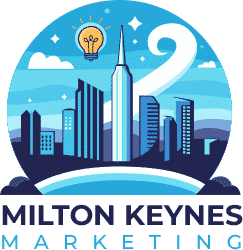AI Marketing Training in Milton Keynes
Practical AI marketing training in Milton Keynes for UK businesses: hands‑on courses covering tools, ethics, KPIs and implementation roadmaps.
Milton Keynes Marketing: Practical AI Marketing Training
Understanding AI Marketing Training for UK Businesses
What AI Marketing Is And Why It Transforms Growth
AI marketing uses software to analyze data, automate tasks, and personalise messages, enabling faster decisions. These capabilities help marketers act on insights with confidence and scale efforts across channels.
AI helps uncover patterns in customer behaviour and optimize budgets across campaigns. This leads to smarter media mix decisions and more efficient use of every marketing pound.
Foundations: AI Fundamentals For Marketers
A solid AI foundation starts with understanding machine learning, natural language processing, and predictive analytics. These concepts empower marketers to ask better questions and interpret automated insights with confidence.
Data Ethics And Compliance For Marketing Campaigns
Ethics and privacy must be embedded into every AI project from the start. We explain how data collection, consent, and responsible use align with UK rules and best practices.
Key Metrics To Track In Early AI Campaigns
Define baseline metrics before you deploy AI features. Track engagement, conversion lift, and data quality over the first weeks to gauge impact.
Key Skills You Gain From AI Marketing Training
A comprehensive program blends theory with hands-on practice, ensuring skills translate to real-world results. Participants learn to blend data, technology, and creativity for better campaigns.
Hands-On Tools And Platforms For Marketers
We cover tools like Chatbots, predictive analytics, and content automation. These platforms help you save time while boosting relevance.
- Chatbots automate customer interactions and improve service.
- Predictive analytics forecast buying intent and optimize media spend.
- Content generation tools draft copy at scale and support campaign throughput.
Practical AI Implementation Roadmaps
Build clear plans that fit your business stage and goals. We teach how to select the right tools and integrate them with existing workflows.
Ethics In Practice: Privacy And Bias
Discussing data privacy, model bias, and governance ensures fair marketing practices. Ethical considerations protect customer trust and long‑term brand value.
Popular Tools And How They Help
AI marketing training covers the major platforms that drive real results. You’ll learn what each tool does best and where to deploy it.
Salesforce Einstein For Personalised CRM
This AI‑driven CRM enhances understanding of customer preferences and behaviour. Marketers can tailor journeys based on predictive insights.
HubSpot AI Capabilities For Campaigns
HubSpot’s AI features enable personalised content and automated emails aligned to user actions. This strengthens engagement without sacrificing efficiency.
Content Generation Tools: Benefits And Limits
AI drafting tools accelerate content production while maintaining brand voice. We also teach how to review, edit, and optimize AI-generated copy for accuracy and tone.
Measuring Success: KPIs And Analytics
Measurement turns AI investments into accountable outcomes. Clear KPIs help teams stay focused on what adds real value.
Defining KPIs For AI Marketing
Set behavioural, engagement, and revenue-oriented metrics from the outset. Establish targets for each campaign phase to track progress.
Interpreting Data To Improve Campaigns
Translate analytics into actionable optimisations. Learn how to adjust targeting, creative, and sequencing based on results.
Feedback And Continuous Improvement
Collect participant feedback to refine training and tools. Ongoing learning helps teams stay ahead of evolving AI capabilities.
Future Trends And Keeping Up
AI marketing continues to evolve quickly, demanding adaptive learning and proactive adoption. Staying current protects competitiveness and drives continuous improvement.
Ongoing Training And Refreshers
AI technology evolves rapidly, so ongoing sessions and updates are essential. Regular refreshers keep teams aligned with new tools and methods.
Industry Events And Networking
Attending conferences and workshops exposes teams to the latest innovations and best practices. Networking accelerates knowledge transfer and collaboration.
Ethical Governance And Compliance
Governance frameworks ensure data privacy and responsible use. Aligning with evolving regulations safeguards trust and reputation.
Conclusion And How To Get Started Today
AI marketing offers powerful capabilities, but success comes from practical application and ongoing learning. A structured training program helps your team translate insights into improved campaigns and measurable outcomes.
Milton Keynes Marketing is here to help you design a tailored AI marketing training plan that fits your business goals and audience. We balance theory with hands‑on practice, ensuring your team gains immediately usable skills.
Real‑World Results: Case Studies And Examples
Case studies illustrate how AI marketing delivers tangible gains in customer engagement and ROI. For a deeper look at outcomes and process, explore our Case Studies.
Next Steps And How To Talk To Us
To start your journey, complete our contact us form or call 07484866107 to arrange a free digital marketing consultation. We’ll review your objectives, current setup, and a practical path to leverage AI in your marketing mix.
Ready to unlock AI-powered growth for your business? Reach out today and discover how AI marketing training can elevate your team’s effectiveness.
Contact our digital marketing agency for a free consultation. {
“@context”: “https://schema.org”,
“@type”: “FAQPage”,
“mainEntity”: [
{
“@type”: “Question”,
“name”: “What is AI marketing and how does it drive business growth?”,
“acceptedAnswer”: {
“@type”: “Answer”,
“text”: “AI marketing uses software to analyze data, automate tasks, and personalise messages to enable faster decisions and improved campaign efficiency.”
}
},
{
“@type”: “Question”,
“name”: “What are the foundational AI concepts marketers need to understand?”,
“acceptedAnswer”: {
“@type”: “Answer”,
“text”: “Fundamental AI concepts include machine learning, natural language processing, and predictive analytics to interpret automated insights with confidence.”
}
},
{
“@type”: “Question”,
“name”: “How does data ethics and compliance impact AI marketing campaigns?”,
“acceptedAnswer”: {
“@type”: “Answer”,
“text”: “Ethics and privacy must be integrated into AI projects, ensuring data collection, consent, and responsible use comply with UK laws and best practices.”
}
},
{
“@type”: “Question”,
“name”: “What key metrics should be tracked during early AI campaigns?”,
“acceptedAnswer”: {
“@type”: “Answer”,
“text”: “Baseline metrics such as engagement, conversion rates, and data quality should be monitored over the first weeks to assess AI impact.”
}
},
{
“@type”: “Question”,
“name”: “What skills will I gain from Milton Keynes Marketing’s AI training?”,
“acceptedAnswer”: {
“@type”: “Answer”,
“text”: “Participants learn to blend data, technology, and creativity through hands-on practice, leading to better and measurable marketing results.”
}
},
{
“@type”: “Question”,
“name”: “Which AI tools and platforms are covered in the training?”,
“acceptedAnswer”: {
“@type”: “Answer”,
“text”: “Training covers tools like chatbots, predictive analytics, and content automation to improve relevance and save time.”
}
},
{
“@type”: “Question”,
“name”: “How do practical AI implementation roadmaps help my business?”,
“acceptedAnswer”: {
“@type”: “Answer”,
“text”: “They guide you in selecting suitable tools and integrating AI with your existing workflows based on your business stage and goals.”
}
},
{
“@type”: “Question”,
“name”: “How does Milton Keynes Marketing ensure ethical AI practices?”,
“acceptedAnswer”: {
“@type”: “Answer”,
“text”: “We address data privacy, model bias, and governance to promote fair, responsible, and compliant marketing practices.”
}
},
{
“@type”: “Question”,
“name”: “What are some examples of AI tools that improve marketing results?”,
“acceptedAnswer”: {
“@type”: “Answer”,
“text”: “Tools like Salesforce Einstein for CRM, HubSpot AI features for campaigns, and content generation platforms each enhance different aspects of marketing.”
}
},
{
“@type”: “Question”,
“name”: “How can I measure the success of AI marketing efforts?”,
“acceptedAnswer”: {
“@type”: “Answer”,
“text”: “Define clear KPIs such as engagement, behaviour, and revenue metrics, and use analytics to interpret data for ongoing campaign optimisation.”
}
}
]
}


